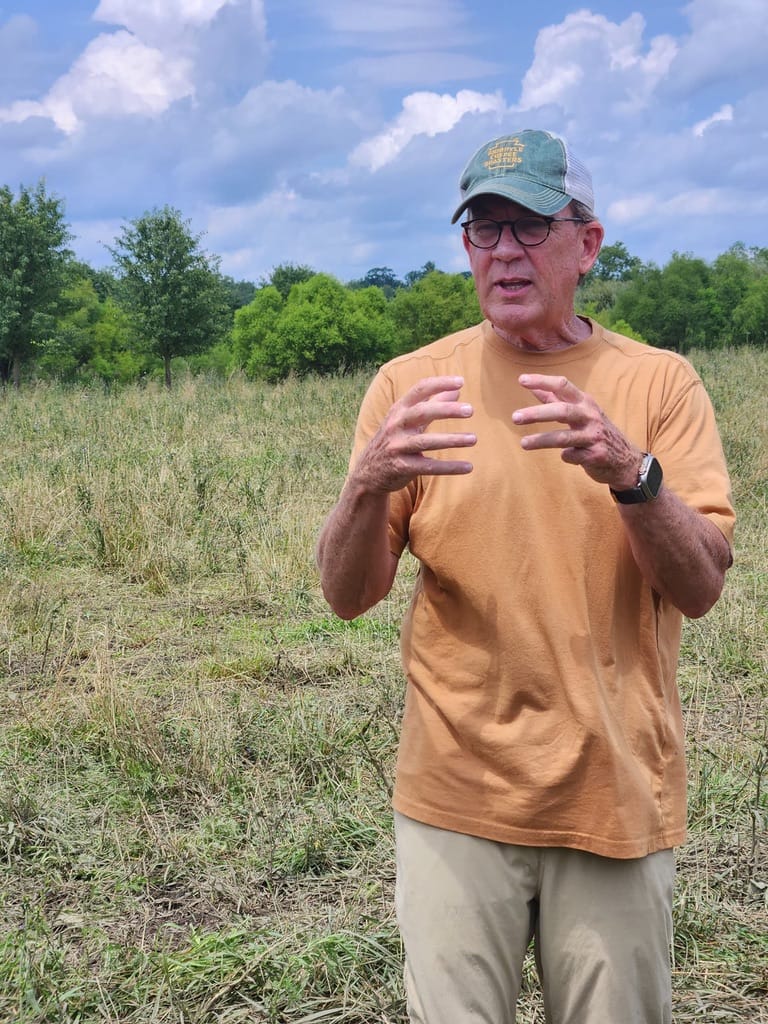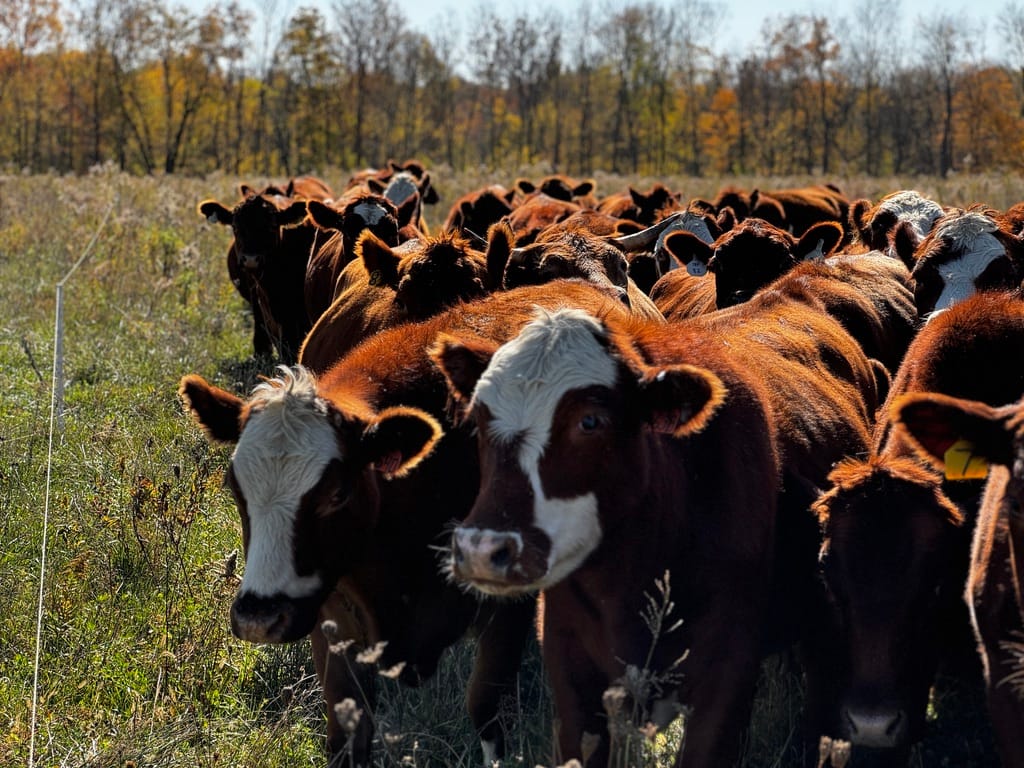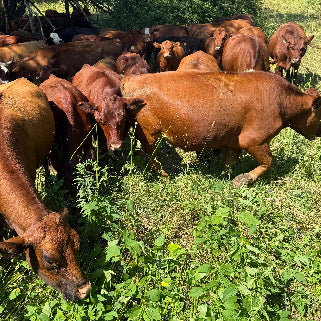
Localist-Minded Environmentalism: How Tyner Pond Farm is Building a Sustainable and Resilient Food System with Consumer Support
At Tyner Pond Farm, we have been working to build a sustainable and resilient local food system for many years. Our approach is rooted in the principles of regenerative farming, local sourcing, and community-based action. Although we hadn't heard the phrase "localist-minded environmentalism" until recently, this concept seems to align with our philosophy and goals.
 Localist-Minded Environmentalism
I recently discovered Thomas Massie who's a congressman from Kentucky known for his libertarian views and advocacy for small government and individual liberty. Massie has been a vocal advocate for localist-minded environmentalism, which emphasizes the importance of community-based action and local solutions to environmental problems.
Massie has also been a proponent of sustainable and regenerative farming practices. He has argued that these practices can help reduce the environmental impact of agriculture while also improving soil health and increasing crop yields. He has sponsored legislation aimed at promoting sustainable farming practices and reducing the use of harmful chemicals in agriculture.
Localist-minded environmentalism is a movement that emphasizes the importance of local solutions and community-based action to address environmental issues. This approach recognizes that environmental problems often have local causes and impacts, and therefore local communities should play a central role in addressing them. We couldn't agree more.
At Tyner Pond Farm, we believe that sustainable and resilient food systems are essential for both environmental and human health. That's why we have been working to promote sustainable and regenerative farming practices, reduce food miles, and build strong relationships with our community. We believe that by working together, we can build a more sustainable and resilient community.
However, we also recognize that we cannot achieve our goals alone. Consumer support is critical in supporting the activities that drive the environment we all want. By supporting local and sustainable food systems, consumers can help promote environmental sustainability, reduce the carbon footprint of food production, and support local economies.
Local food systems can provide many benefits beyond the environment. By sourcing food as locally as possible, consumers can ensure that their food is fresh and nutritious, and they can support local farmers and businesses. By building strong relationships with local food producers, consumers can also learn more about how their food is grown and make more informed choices about what they eat.
At Tyner Pond Farm, we work hard to build strong relationships with our customers, who appreciate the quality and freshness of our products, as well as the transparency and traceability of our farming practices. By supporting local farmers like us, consumers can help build more sustainable and resilient food systems that benefit everyone.
In conclusion, localist-minded environmentalism is a movement that emphasizes the importance of local solutions and community-based action to address environmental issues. At Tyner Pond Farm, we have been working to promote sustainable and regenerative farming practices, reduce food miles, and build strong relationships with our community.
However, we recognize that we cannot achieve our goals alone. Consumer support is critical to the activities that drive the environment we all want. By supporting local and sustainable food systems, consumers can help promote environmental sustainability, reduce the carbon footprint of food production, and support local economies. Together, we can build a more sustainable and resilient world.
Localist-Minded Environmentalism
I recently discovered Thomas Massie who's a congressman from Kentucky known for his libertarian views and advocacy for small government and individual liberty. Massie has been a vocal advocate for localist-minded environmentalism, which emphasizes the importance of community-based action and local solutions to environmental problems.
Massie has also been a proponent of sustainable and regenerative farming practices. He has argued that these practices can help reduce the environmental impact of agriculture while also improving soil health and increasing crop yields. He has sponsored legislation aimed at promoting sustainable farming practices and reducing the use of harmful chemicals in agriculture.
Localist-minded environmentalism is a movement that emphasizes the importance of local solutions and community-based action to address environmental issues. This approach recognizes that environmental problems often have local causes and impacts, and therefore local communities should play a central role in addressing them. We couldn't agree more.
At Tyner Pond Farm, we believe that sustainable and resilient food systems are essential for both environmental and human health. That's why we have been working to promote sustainable and regenerative farming practices, reduce food miles, and build strong relationships with our community. We believe that by working together, we can build a more sustainable and resilient community.
However, we also recognize that we cannot achieve our goals alone. Consumer support is critical in supporting the activities that drive the environment we all want. By supporting local and sustainable food systems, consumers can help promote environmental sustainability, reduce the carbon footprint of food production, and support local economies.
Local food systems can provide many benefits beyond the environment. By sourcing food as locally as possible, consumers can ensure that their food is fresh and nutritious, and they can support local farmers and businesses. By building strong relationships with local food producers, consumers can also learn more about how their food is grown and make more informed choices about what they eat.
At Tyner Pond Farm, we work hard to build strong relationships with our customers, who appreciate the quality and freshness of our products, as well as the transparency and traceability of our farming practices. By supporting local farmers like us, consumers can help build more sustainable and resilient food systems that benefit everyone.
In conclusion, localist-minded environmentalism is a movement that emphasizes the importance of local solutions and community-based action to address environmental issues. At Tyner Pond Farm, we have been working to promote sustainable and regenerative farming practices, reduce food miles, and build strong relationships with our community.
However, we recognize that we cannot achieve our goals alone. Consumer support is critical to the activities that drive the environment we all want. By supporting local and sustainable food systems, consumers can help promote environmental sustainability, reduce the carbon footprint of food production, and support local economies. Together, we can build a more sustainable and resilient world.
 Localist-Minded Environmentalism
I recently discovered Thomas Massie who's a congressman from Kentucky known for his libertarian views and advocacy for small government and individual liberty. Massie has been a vocal advocate for localist-minded environmentalism, which emphasizes the importance of community-based action and local solutions to environmental problems.
Massie has also been a proponent of sustainable and regenerative farming practices. He has argued that these practices can help reduce the environmental impact of agriculture while also improving soil health and increasing crop yields. He has sponsored legislation aimed at promoting sustainable farming practices and reducing the use of harmful chemicals in agriculture.
Localist-minded environmentalism is a movement that emphasizes the importance of local solutions and community-based action to address environmental issues. This approach recognizes that environmental problems often have local causes and impacts, and therefore local communities should play a central role in addressing them. We couldn't agree more.
At Tyner Pond Farm, we believe that sustainable and resilient food systems are essential for both environmental and human health. That's why we have been working to promote sustainable and regenerative farming practices, reduce food miles, and build strong relationships with our community. We believe that by working together, we can build a more sustainable and resilient community.
However, we also recognize that we cannot achieve our goals alone. Consumer support is critical in supporting the activities that drive the environment we all want. By supporting local and sustainable food systems, consumers can help promote environmental sustainability, reduce the carbon footprint of food production, and support local economies.
Local food systems can provide many benefits beyond the environment. By sourcing food as locally as possible, consumers can ensure that their food is fresh and nutritious, and they can support local farmers and businesses. By building strong relationships with local food producers, consumers can also learn more about how their food is grown and make more informed choices about what they eat.
At Tyner Pond Farm, we work hard to build strong relationships with our customers, who appreciate the quality and freshness of our products, as well as the transparency and traceability of our farming practices. By supporting local farmers like us, consumers can help build more sustainable and resilient food systems that benefit everyone.
In conclusion, localist-minded environmentalism is a movement that emphasizes the importance of local solutions and community-based action to address environmental issues. At Tyner Pond Farm, we have been working to promote sustainable and regenerative farming practices, reduce food miles, and build strong relationships with our community.
However, we recognize that we cannot achieve our goals alone. Consumer support is critical to the activities that drive the environment we all want. By supporting local and sustainable food systems, consumers can help promote environmental sustainability, reduce the carbon footprint of food production, and support local economies. Together, we can build a more sustainable and resilient world.
Localist-Minded Environmentalism
I recently discovered Thomas Massie who's a congressman from Kentucky known for his libertarian views and advocacy for small government and individual liberty. Massie has been a vocal advocate for localist-minded environmentalism, which emphasizes the importance of community-based action and local solutions to environmental problems.
Massie has also been a proponent of sustainable and regenerative farming practices. He has argued that these practices can help reduce the environmental impact of agriculture while also improving soil health and increasing crop yields. He has sponsored legislation aimed at promoting sustainable farming practices and reducing the use of harmful chemicals in agriculture.
Localist-minded environmentalism is a movement that emphasizes the importance of local solutions and community-based action to address environmental issues. This approach recognizes that environmental problems often have local causes and impacts, and therefore local communities should play a central role in addressing them. We couldn't agree more.
At Tyner Pond Farm, we believe that sustainable and resilient food systems are essential for both environmental and human health. That's why we have been working to promote sustainable and regenerative farming practices, reduce food miles, and build strong relationships with our community. We believe that by working together, we can build a more sustainable and resilient community.
However, we also recognize that we cannot achieve our goals alone. Consumer support is critical in supporting the activities that drive the environment we all want. By supporting local and sustainable food systems, consumers can help promote environmental sustainability, reduce the carbon footprint of food production, and support local economies.
Local food systems can provide many benefits beyond the environment. By sourcing food as locally as possible, consumers can ensure that their food is fresh and nutritious, and they can support local farmers and businesses. By building strong relationships with local food producers, consumers can also learn more about how their food is grown and make more informed choices about what they eat.
At Tyner Pond Farm, we work hard to build strong relationships with our customers, who appreciate the quality and freshness of our products, as well as the transparency and traceability of our farming practices. By supporting local farmers like us, consumers can help build more sustainable and resilient food systems that benefit everyone.
In conclusion, localist-minded environmentalism is a movement that emphasizes the importance of local solutions and community-based action to address environmental issues. At Tyner Pond Farm, we have been working to promote sustainable and regenerative farming practices, reduce food miles, and build strong relationships with our community.
However, we recognize that we cannot achieve our goals alone. Consumer support is critical to the activities that drive the environment we all want. By supporting local and sustainable food systems, consumers can help promote environmental sustainability, reduce the carbon footprint of food production, and support local economies. Together, we can build a more sustainable and resilient world.
Tags:
Previous post
The Importance of Grass Fed Beef Without Antibiotics for Soil Microbes and Carbon Sequestration
Next post
















